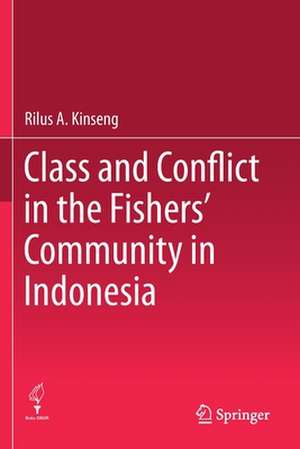Class and Conflict in the Fishers' Community in Indonesia
Autor Rilus A. Kinsengen Limba Engleză Paperback – 15 ian 2021
| Toate formatele și edițiile | Preț | Express |
|---|---|---|
| Paperback (1) | 635.15 lei 6-8 săpt. | |
| Springer Nature Singapore – 15 ian 2021 | 635.15 lei 6-8 săpt. | |
| Hardback (1) | 561.98 lei 39-44 zile | |
| Springer Nature Singapore – 15 ian 2020 | 561.98 lei 39-44 zile |
Preț: 635.15 lei
Preț vechi: 747.23 lei
-15% Nou
Puncte Express: 953
Preț estimativ în valută:
121.54€ • 127.06$ • 102.71£
121.54€ • 127.06$ • 102.71£
Carte tipărită la comandă
Livrare economică 06-20 martie
Preluare comenzi: 021 569.72.76
Specificații
ISBN-13: 9789811509889
ISBN-10: 9811509883
Ilustrații: XVII, 168 p. 38 illus.
Dimensiuni: 155 x 235 mm
Greutate: 0.27 kg
Ediția:1st ed. 2020
Editura: Springer Nature Singapore
Colecția Springer
Locul publicării:Singapore, Singapore
ISBN-10: 9811509883
Ilustrații: XVII, 168 p. 38 illus.
Dimensiuni: 155 x 235 mm
Greutate: 0.27 kg
Ediția:1st ed. 2020
Editura: Springer Nature Singapore
Colecția Springer
Locul publicării:Singapore, Singapore
Cuprins
Preface to the 2nd Edition.- Chapter 1. Introduction.- Chapter 2. Class, Conflict, and Fisherman’s Conditions in Indonesia.- Chapter 3. General Condition of the Research Location.- Chapter 4. Fisherman’s Class Structure and Class Relations.- Chapter 5. Class Formation of Fisher in Balikpapan.- Chapter 6. Fishermen’s Class Formations in Balikpapan.- Chapter 7. Patterns of Fisher Class Conflict.- Bibliography.- Glossary.- About the author.
Notă biografică
Rilus A. Kinseng is a sociology lecturer at the Department of Communication and Community Development in the Faculty of Human Ecology at IPB University, Indonesia. His research interest is primarily on resource-based conflicts and social change, especially among coastal and rural communities. Recently, his studies have also covered issues regarding the development of tourism in rural communities in Indonesia.
Textul de pe ultima copertă
This book analyses social conflict among fishers in Indonesia by implementing class theory, thus adopting a new approach to analysing fishers’ conflicts in Indonesia. In using this approach, the book enables a comprehensive understanding of the nature of fishers’ social conflicts. It demonstrates that the primary cause triggering conflict among fishers in Indonesia is not exploitation, but domination. This domination causes injustice in terms of access among fishers, which in turn threatens their livelihood. The author unpacks the influence of political parties, and how macro-economic conditions and public policy have become contextual variables of these class conflicts in the fisheries community. The book presents the unique characteristics of class conflicts among fishers compared to class conflicts in industrial sectors, underpinned by Marxist theory. This book will be relevant to fisheries policy-makers in Indonesia and abroad, researchers and students in anthropology, sociology, and development economics, as well as community and rural development specialists and conservationists.
Caracteristici
One of very few books analysing fishers' conflict in Indonesia using class theory Demonstrates the uniqueness of fishers' class conflicts compared to industrial class conflicts The intensive demonstrates that “domination distance” is a key phenomenon in understanding fisher’s class conflicts
